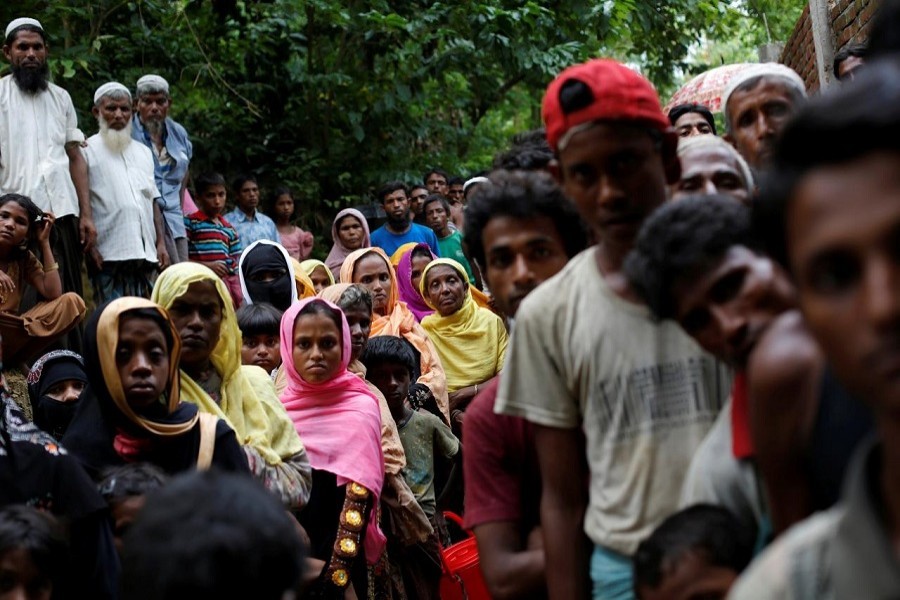Prime Minister Sheikh Hasina has placed five proposals at the United Nations to support the Rohingya politically, financially and legally for their sustainable repatriation to Myanmar from Bangladesh.
Speaking at a side event on the Rohingya crisis at the UN General Assembly on Thursday, Hasina pointed out previous attempts to send back the Rohingya, even with China-brokered talks, failed, reports bdnews24.com.
Now the adverse impact of the ongoing internal conflicts in Myanmar has kept “us deeply concerned, as this might create further obstacles for the prospect of commencing their repatriation”, she said.
August marked five years of the prolonged Rohingya crisis triggered by a brutal campaign by the Myanmar military in 2017.
The civil administration of Myanmar defended the military in the World Court, trying to block the case started by Gambia on genocide charges. But the UN’s International Court of Justice in July ruled that it has jurisdiction over the case, paving the way for the case to be heard in full.
Meanwhile, Myanmar has plunged back into full military rule with the elected civilian government toppled and its leaders in jail.
The Myanmar military is now fighting rebels in different corners of the country. Recently, cross-border shelling from Myanmar killed a Rohingya teenager while a Bangladeshi man lost his leg in a suspected landmine blast amid the conflict.
In these circumstances, Hasina said Bangladesh is against any form of impunity from justice and will support any initiative to ensure justice.
While the current focus of the international community, UN and ASEAN, is to bring back normalcy in Myanmar, Bangladesh looks forward to their stronger role to ensure sustainable repatriation of the Rohingyas to their homeland; and to bring peace and justice to the Myanmar people, the prime minister said.
She put emphasis on the following actions to be taken by the international community:
1. To support the Rohigyas politically and financially,
2. To intervene in the proceedings before the International Court of Justice, International Criminal Court and national courts, including supporting the Gambia in the ICJ, in order to enforce international law and to strengthen the fight against human rights violations in Myanmar,
3. To create pressure on Myanmar to stop the continued repression of ethnic and religious minorities,
4. To strongly ask for Myanmar’s adherence to its commitments under ASEAN’s Five-Point Consensus, and
5. To make efforts so that Myanmar agrees for unhindered humanitarian access.
Hasina said targeted sanctions of a few selected individuals cannot have a binding impact on Myanmar. “The political will of the Myanmar authorities is crucial to resolve the crisis.”
“Increasing trade and military relations with Myanmar is promoting the interest of Myanmar. Bangladesh maintains that the question of international justice and accountability will be critical in finding a durable solution to the Rohingya crisis and an important confidence-building measure for the sustainable repatriation of the Rohingyas.
“The UN and international partners need to undertake tangible actions and projects to create an environment conducive for sustainable repatriation.”
Hasina highlighted the Rohingya history in Myanmar, which calls the Rohingya “Bengalis” and denies them citizenship.
She said the Rohingya have been living since the 8th century in Arakan, which is now the Rakhine State of Myanmar.
In 1948, when Myanmar became independent, the new government passed the Union Citizenship Act defining which ethnicities could gain citizenship.
It targeted the Rohingyas as aliens of a different race, Hasina said. In 1982, a new citizenship law was passed which did not recognise the Rohingya as one of the country’s 135 ethnic groups.
However, in 1952, when U Nu became president, he included in his cabinet two Muslim Rohingya - U Raschid as Minister of Trade and Development, and the other, Sultan Mahmud, as Minister of Health.
His parliament also had six Rohingya members and two secretaries.
“It was evident that Muslim Rohingyas still had standing as citizens as only citizens could be in the cabinet and the parliament,” the prime minister said.
“The current crisis originated in Myanmar, and its solution lies there. Systematic exclusion and indiscriminate persecutions against Rohingyas by successive governments of Myanmar since the 1960s led to their continued influx into Bangladesh.”


